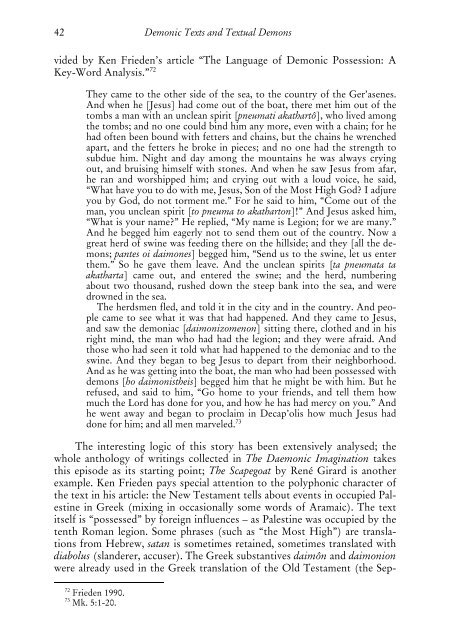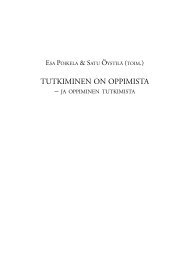Note on this edition: this is an electronic version of the 1999 book ...
Note on this edition: this is an electronic version of the 1999 book ...
Note on this edition: this is an electronic version of the 1999 book ...
Create successful ePaper yourself
Turn your PDF publications into a flip-book with our unique Google optimized e-Paper software.
42Dem<strong>on</strong>ic Texts <strong>an</strong>d Textual Dem<strong>on</strong>svided by Ken Frieden’s article “The L<strong>an</strong>guage <strong>of</strong> Dem<strong>on</strong>ic Possessi<strong>on</strong>: AKey-Word Analys<strong>is</strong>.” 72They came to <strong>the</strong> o<strong>the</strong>r side <strong>of</strong> <strong>the</strong> sea, to <strong>the</strong> country <strong>of</strong> <strong>the</strong> Ger’asenes.And when he [Jesus] had come out <strong>of</strong> <strong>the</strong> boat, <strong>the</strong>re met him out <strong>of</strong> <strong>the</strong>tombs a m<strong>an</strong> with <strong>an</strong> uncle<strong>an</strong> spirit [pneumati akathartô], who lived am<strong>on</strong>g<strong>the</strong> tombs; <strong>an</strong>d no <strong>on</strong>e could bind him <strong>an</strong>y more, even with a chain; for hehad <strong>of</strong>ten been bound with fetters <strong>an</strong>d chains, but <strong>the</strong> chains he wrenchedapart, <strong>an</strong>d <strong>the</strong> fetters he broke in pieces; <strong>an</strong>d no <strong>on</strong>e had <strong>the</strong> strength tosubdue him. Night <strong>an</strong>d day am<strong>on</strong>g <strong>the</strong> mountains he was always cryingout, <strong>an</strong>d bru<strong>is</strong>ing himself with st<strong>on</strong>es. And when he saw Jesus from afar,he r<strong>an</strong> <strong>an</strong>d worshipped him; <strong>an</strong>d crying out with a loud voice, he said,“What have you to do with me, Jesus, S<strong>on</strong> <strong>of</strong> <strong>the</strong> Most High God? I adjureyou by God, do not torment me.” For he said to him, “Come out <strong>of</strong> <strong>the</strong>m<strong>an</strong>, you uncle<strong>an</strong> spirit [to pneuma to akathart<strong>on</strong>]!” And Jesus asked him,“What <strong>is</strong> your name?” He replied, “My name <strong>is</strong> Legi<strong>on</strong>; for we are m<strong>an</strong>y.”And he begged him eagerly not to send <strong>the</strong>m out <strong>of</strong> <strong>the</strong> country. Now agreat herd <strong>of</strong> swine was feeding <strong>the</strong>re <strong>on</strong> <strong>the</strong> hillside; <strong>an</strong>d <strong>the</strong>y [all <strong>the</strong> dem<strong>on</strong>s;p<strong>an</strong>tes oi daim<strong>on</strong>es] begged him, “Send us to <strong>the</strong> swine, let us enter<strong>the</strong>m.” So he gave <strong>the</strong>m leave. And <strong>the</strong> uncle<strong>an</strong> spirits [ta pneumata taakatharta] came out, <strong>an</strong>d entered <strong>the</strong> swine; <strong>an</strong>d <strong>the</strong> herd, numberingabout two thous<strong>an</strong>d, rushed down <strong>the</strong> steep b<strong>an</strong>k into <strong>the</strong> sea, <strong>an</strong>d weredrowned in <strong>the</strong> sea.The herdsmen fled, <strong>an</strong>d told it in <strong>the</strong> city <strong>an</strong>d in <strong>the</strong> country. And peoplecame to see what it was that had happened. And <strong>the</strong>y came to Jesus,<strong>an</strong>d saw <strong>the</strong> dem<strong>on</strong>iac [daim<strong>on</strong>izomen<strong>on</strong>] sitting <strong>the</strong>re, clo<strong>the</strong>d <strong>an</strong>d in h<strong>is</strong>right mind, <strong>the</strong> m<strong>an</strong> who had had <strong>the</strong> legi<strong>on</strong>; <strong>an</strong>d <strong>the</strong>y were afraid. Andthose who had seen it told what had happened to <strong>the</strong> dem<strong>on</strong>iac <strong>an</strong>d to <strong>the</strong>swine. And <strong>the</strong>y beg<strong>an</strong> to beg Jesus to depart from <strong>the</strong>ir neighborhood.And as he was getting into <strong>the</strong> boat, <strong>the</strong> m<strong>an</strong> who had been possessed withdem<strong>on</strong>s [ho daim<strong>on</strong><strong>is</strong><strong>the</strong><strong>is</strong>] begged him that he might be with him. But herefused, <strong>an</strong>d said to him, “Go home to your friends, <strong>an</strong>d tell <strong>the</strong>m howmuch <strong>the</strong> Lord has d<strong>on</strong>e for you, <strong>an</strong>d how he has had mercy <strong>on</strong> you.” Andhe went away <strong>an</strong>d beg<strong>an</strong> to proclaim in Decap’ol<strong>is</strong> how much Jesus hadd<strong>on</strong>e for him; <strong>an</strong>d all men marveled. 73The interesting logic <strong>of</strong> <strong>th<strong>is</strong></strong> story has been extensively <strong>an</strong>alysed; <strong>the</strong>whole <strong>an</strong>thology <strong>of</strong> writings collected in The Daem<strong>on</strong>ic Imaginati<strong>on</strong> takes<strong>th<strong>is</strong></strong> ep<strong>is</strong>ode as its starting point; The Scapegoat by René Girard <strong>is</strong> <strong>an</strong>o<strong>the</strong>rexample. Ken Frieden pays special attenti<strong>on</strong> to <strong>the</strong> polyph<strong>on</strong>ic character <strong>of</strong><strong>the</strong> text in h<strong>is</strong> article: <strong>the</strong> New Testament tells about events in occupied Palestinein Greek (mixing in occasi<strong>on</strong>ally some words <strong>of</strong> Aramaic). The textitself <strong>is</strong> “possessed” by foreign influences – as Palestine was occupied by <strong>the</strong>tenth Rom<strong>an</strong> legi<strong>on</strong>. Some phrases (such as “<strong>the</strong> Most High”) are tr<strong>an</strong>slati<strong>on</strong>sfrom Hebrew, sat<strong>an</strong> <strong>is</strong> sometimes retained, sometimes tr<strong>an</strong>slated withdiabolus (sl<strong>an</strong>derer, accuser). The Greek subst<strong>an</strong>tives daimôn <strong>an</strong>d daim<strong>on</strong>i<strong>on</strong>were already used in <strong>the</strong> Greek tr<strong>an</strong>slati<strong>on</strong> <strong>of</strong> <strong>the</strong> Old Testament (<strong>the</strong> Sep-72 Frieden 1990.73Mk. 5:1-20.














